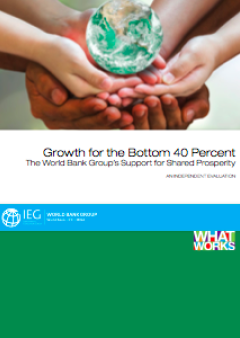
The World Bank Group's Support for Shared Prosperity - Growth for the Bottom 40 Percent
One of the main findings of the evaluation is that the World Bank has made a significant effort to incorporate the shared prosperity goal—since its introduction in 2013--into its various products and services, across regions, global practices and World Bank Group institutions. In addition to the World Bank Group's first goal of poverty reduction, shared prosperity goal is defined as the growth of real incomes of the bottom 40 percent. Lessons from the evaluation of early implementation of the goal and the World Bank Group's related, equity oriented operations pre-2013 period, however, suggest that an increased focus on distributional issues in the World Bank's lending projects does not automatically lead to improved development outcomes.
This implies that continued attention will be needed to ensure success of the new shared prosperity agenda. To that end, a key factor identified in this evaluation will be the inclusion in World Bank Group strategies and projects of well-defined theories of change that explain how and under what conditions World Bank interventions are expected to lead to improved shared prosperity outcomes.
Moreover, it is important to ensure that the associated results frameworks allow for adequately monitoring impacts on the bottom 40 percent, and that data is available for measuring World Bank contributions.
Furthermore, strong analytical underpinnings are critical to strengthening the design of shared prosperity–focused interventions. This requires ensuring that core World Bank diagnostics are adequately funded and contain rigorous analysis of distributional effects.
Also, using the latest advances in geospatial data collection and the matching of spatial subnational data, the report also analyzes geographic footprint of the World Bank projects and it recommends that the Bank monitor systematically spatial congruence of World Bank projects with the geographic distribution of the bottom 40 percent populations.
Last but not least, stronger efforts are needed to make sure that World Bank Group staff are not only aware of what the shared prosperity goal entails for the institution and its clients, but also have the skills needed for effectively incorporating and monitoring distributional objectives in the result chains of World Bank Group strategies and projects.
